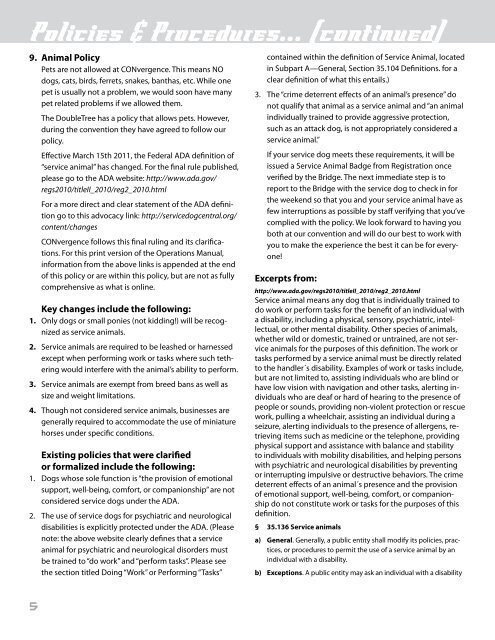2012 Souvenir Program Book (PDF) - Convergence
2012 Souvenir Program Book (PDF) - Convergence
2012 Souvenir Program Book (PDF) - Convergence
Create successful ePaper yourself
Turn your PDF publications into a flip-book with our unique Google optimized e-Paper software.
Policies & Procedures... (continued)<br />
9. Animal Policy<br />
Pets are not allowed at CONvergence. This means NO<br />
dogs, cats, birds, ferrets, snakes, banthas, etc. While one<br />
pet is usually not a problem, we would soon have many<br />
pet related problems if we allowed them.<br />
The DoubleTree has a policy that allows pets. However,<br />
during the convention they have agreed to follow our<br />
policy.<br />
Effective March 15th 2011, the Federal ADA definition of<br />
“service animal” has changed. For the final rule published,<br />
please go to the ADA website: http://www.ada.gov/<br />
regs2010/titleII_2010/reg2_2010.html<br />
For a more direct and clear statement of the ADA definition<br />
go to this advocacy link: http://servicedogcentral.org/<br />
content/changes<br />
CONvergence follows this final ruling and its clarifications.<br />
For this print version of the Operations Manual,<br />
information from the above links is appended at the end<br />
of this policy or are within this policy, but are not as fully<br />
comprehensive as what is online.<br />
Key changes include the following:<br />
1. Only dogs or small ponies (not kidding!) will be recognized<br />
as service animals.<br />
2. Service animals are required to be leashed or harnessed<br />
except when performing work or tasks where such tethering<br />
would interfere with the animal’s ability to perform.<br />
3. Service animals are exempt from breed bans as well as<br />
size and weight limitations.<br />
4. Though not considered service animals, businesses are<br />
generally required to accommodate the use of miniature<br />
horses under specific conditions.<br />
Existing policies that were clarified<br />
or formalized include the following:<br />
1. Dogs whose sole function is “the provision of emotional<br />
support, well-being, comfort, or companionship” are not<br />
considered service dogs under the ADA.<br />
2. The use of service dogs for psychiatric and neurological<br />
disabilities is explicitly protected under the ADA. (Please<br />
note: the above website clearly defines that a service<br />
animal for psychiatric and neurological disorders must<br />
be trained to “do work” and “perform tasks”. Please see<br />
the section titled Doing “Work” or Performing “Tasks”<br />
5<br />
contained within the definition of Service Animal, located<br />
in Subpart A—General, Section 35.104 Definitions. for a<br />
clear definition of what this entails.)<br />
3. The “crime deterrent effects of an animal’s presence” do<br />
not qualify that animal as a service animal and “an animal<br />
individually trained to provide aggressive protection,<br />
such as an attack dog, is not appropriately considered a<br />
service animal.”<br />
If your service dog meets these requirements, it will be<br />
issued a Service Animal Badge from Registration once<br />
verified by the Bridge. The next immediate step is to<br />
report to the Bridge with the service dog to check in for<br />
the weekend so that you and your service animal have as<br />
few interruptions as possible by staff verifying that you’ve<br />
complied with the policy. We look forward to having you<br />
both at our convention and will do our best to work with<br />
you to make the experience the best it can be for everyone!<br />
Excerpts from:<br />
http://www.ada.gov/regs2010/titleII_2010/reg2_2010.html<br />
Service animal means any dog that is individually trained to<br />
do work or perform tasks for the benefit of an individual with<br />
a disability, including a physical, sensory, psychiatric, intellectual,<br />
or other mental disability. Other species of animals,<br />
whether wild or domestic, trained or untrained, are not service<br />
animals for the purposes of this definition. The work or<br />
tasks performed by a service animal must be directly related<br />
to the handler´s disability. Examples of work or tasks include,<br />
but are not limited to, assisting individuals who are blind or<br />
have low vision with navigation and other tasks, alerting individuals<br />
who are deaf or hard of hearing to the presence of<br />
people or sounds, providing non-violent protection or rescue<br />
work, pulling a wheelchair, assisting an individual during a<br />
seizure, alerting individuals to the presence of allergens, retrieving<br />
items such as medicine or the telephone, providing<br />
physical support and assistance with balance and stability<br />
to individuals with mobility disabilities, and helping persons<br />
with psychiatric and neurological disabilities by preventing<br />
or interrupting impulsive or destructive behaviors. The crime<br />
deterrent effects of an animal´s presence and the provision<br />
of emotional support, well-being, comfort, or companionship<br />
do not constitute work or tasks for the purposes of this<br />
definition.<br />
§ 35.136 Service animals<br />
a) General. Generally, a public entity shall modify its policies, practices,<br />
or procedures to permit the use of a service animal by an<br />
individual with a disability.<br />
b) Exceptions. A public entity may ask an individual with a disability<br />
to remove a service animal from the premises if--<br />
1) The animal is out of control and the animal´s handler does<br />
not take effective action to control it; or<br />
2) The animal is not housebroken.<br />
c) If an animal is properly excluded. If a public entity properly<br />
excludes a service animal under § 35.136(b), it shall give the<br />
individual with a disability the opportunity to participate in the<br />
service, program, or activity without having the service animal on<br />
the premises.<br />
d) Animal under handler´s control. A service animal shall be under<br />
the control of its handler. A service animal shall have a harness,<br />
leash, or other tether, unless either the handler is unable because<br />
of a disability to use a harness, leash, or other tether, or the use of<br />
a harness, leash, or other tether would interfere with the service<br />
animal´s safe, effective performance of work or tasks, in which<br />
case the service animal must be otherwise under the handler´s<br />
control (e.g., voice control, signals, or other effective means).<br />
e) Care or supervision. A public entity is not responsible for the<br />
care or supervision of a service animal.<br />
f) Inquiries. A public entity shall not ask about the nature or extent<br />
of a person´s disability, but may make two inquiries to determine<br />
whether an animal qualifies as a service animal. A public<br />
entity may ask if the animal is required because of a disability<br />
and what work or task the animal has been trained to perform.<br />
A public entity shall not require documentation, such as proof<br />
that the animal has been certified, trained, or licensed as a service<br />
animal. Generally, a public entity may not make these inquiries<br />
about a service animal when it is readily apparent that an animal<br />
is trained to do work or perform tasks for an individual with a<br />
disability (e.g., the dog is observed guiding an individual who is<br />
blind or has low vision, pulling a person´s wheelchair, or providing<br />
assistance with stability or balance to an individual with an<br />
observable mobility disability).<br />
g) Access to areas of a public entity. Individuals with disabilities<br />
shall be permitted to be accompanied by their service animals<br />
in all areas of a public entity´s facilities where members of the<br />
public, participants in services, programs or activities, or invitees,<br />
as relevant, are allowed to go.<br />
h) Surcharges. A public entity shall not ask or require an individual<br />
with a disability to pay a surcharge, even if people accompanied<br />
by pets are required to pay fees, or to comply with other requirements<br />
generally not applicable to people without pets. If a public<br />
entity normally charges individuals for the damage they cause, an<br />
individual with a disability may be charged for damage caused by<br />
his or her service animal.<br />
i) Miniature horses.<br />
A) A public entity shall make reasonable modifications in<br />
policies, practices, or procedures to permit the use of a<br />
miniature horse by an individual with a disability if the<br />
miniature horse has been individually trained to do work<br />
or perform tasks for the benefit of the individual with a<br />
disability.<br />
B) Assessment factors. In determining whether reasonable<br />
modifications in policies, practices, or procedures can be<br />
made to allow a miniature horse into a specific facility, a<br />
public entity shall consider--<br />
1) The type, size, and weight of the miniature horse<br />
and whether the facility can accommodate these<br />
features;<br />
2) Whether the handler has sufficient control of the<br />
miniature horse;<br />
3) Whether the miniature horse is housebroken; and<br />
4) Whether the miniature horse´s presence in a specific<br />
facility compromises legitimate safety requirements<br />
that are necessary for safe operation.<br />
C) Other requirements. Paragraphs 35.136 (c) through (h)<br />
of this section, which apply to service animals, shall also<br />
apply to miniature horses.<br />
The function of Operations is three-fold:<br />
1) Communications<br />
2) Information accumulation & dispersal<br />
3) Problem resolution<br />
Operations is the main communications center and point<br />
of contact for individual departments of the convention<br />
to interact with each other, and for attendees of the convention<br />
to interact with the Convention Committee.<br />
The Operations Bridge<br />
“The Bridge” is open 24 hours a day during the convention<br />
and is located in Verandas 2 & 4. You can reach the<br />
Operations Bridge from any hotel phone at extension<br />
x7215.<br />
Wandering Hosts<br />
In addition to the Bridge, Operations extends its presence<br />
out into the convention in the form of Wandering Hosts,<br />
who are available to answer questions, give directions,<br />
and help resolve problems. If a Wandering Host does not<br />
know the answer to your question, they can help you find<br />
someone who does.<br />
6



